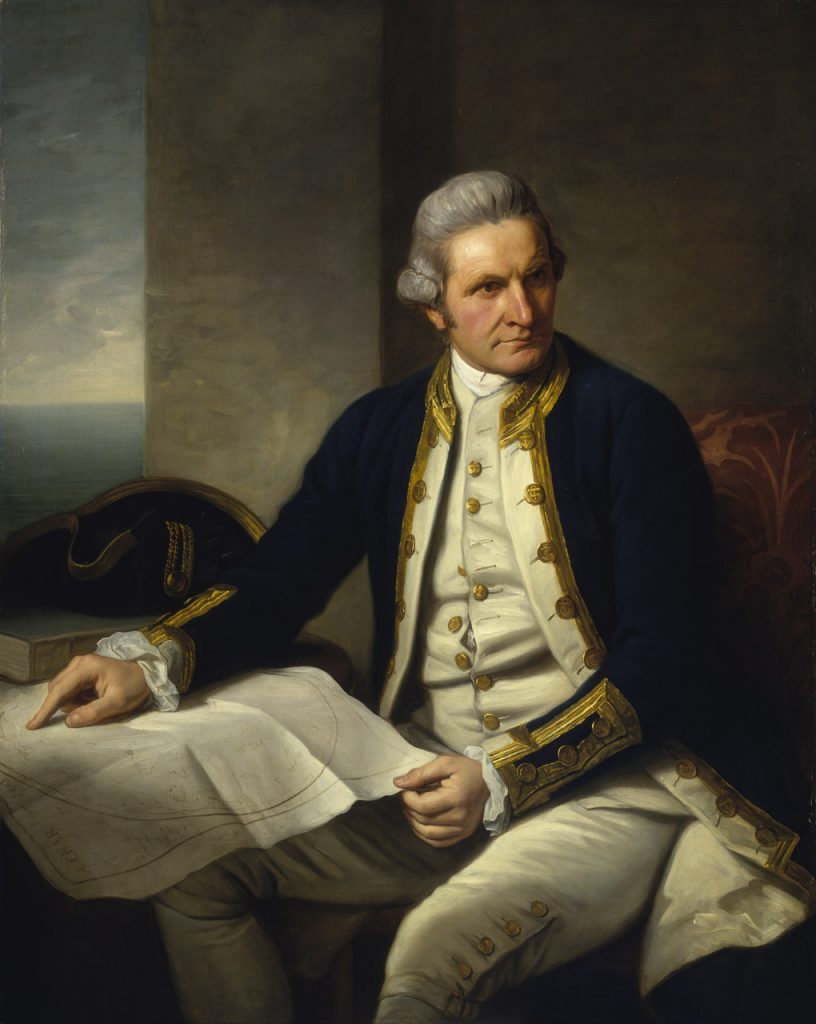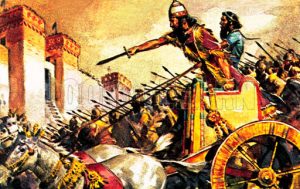Throughout the eighteenth century, colonization and trade were the premier way for a country to spread its influence. Countries all across Europe began to launch naval expeditions in hopes of finding riches elsewhere. The British Empire in particular benefited immensely from imperialism.1 With the efforts of British explorer James Cook, the British Empire was able to expand its influence through newly gathered information about the Pacific.
Born in 1725, James Cook grew up in a small village, named Marton, in the northern county of Yorkshire, England.2 The Cook family was penniless and couldn’t possibly pay for an elaborate education for James, but with the financial backing of the unlikely sponsor, James’ father’s employer, Cook at least had access to a standard education. When Cook graduated, he quickly realized how bland the working world was, and he hated his day-to-day job as a salesman. It was no surprise then when, in July 1746, Cook jumped at the opportunity to be the apprentice of John Walker, master mariner and coal shipper at the nearby port, Whitley.
For the next nine years, under the supervision of John Walker, Cook sharpened his skills in navigation. Walker then offered Cook a command over one of his ships as a reward for his progress. Instead of accepting John Walker’s offered to a high-status position, Cook chose instead to enlist in the British Navy. Soon after enlisting in the Navy, Cook deployed on the Pembroke, a sixty-four-gun ship, to aid in the war efforts against the French.3

While on board the Pembroke, under the tutelage of renowned military surveyor Sam Holland, Cook learned how to improve his accuracy in surveying through trigonometry. The maps he produced were of extremely high quality, so much so that he was awarded the position Surveyor of Newfoundland and given command of a schooner called the Greenville.4 For the next five years, Cook created detailed maps of Canada’s Atlantic coastline. With the help of these maps, the British decisively defeated the French in the Seven Years War in 1763. British authorities were very impressed with Cook’s maps, for they showed that Cook possessed both a flair for seamanship and an understanding of scientific principles.
In 1768, the British Empire rewarded Cooks’ prowess with command of the Endeavor for a scientific expedition. During this voyage Cook, alongside a variety of astronomers, artists, and botanists, sailed to Tahiti to witness the celestial movements of Venus.5 For four months, the crew observed the sky and explored the recently discovered island of Tahiti. After their time on Tahiti, Cook moved on to the secret objective given to him by British Admiralty–to search for the fabled southern continent. While Cook found no mysterious, unknown continent, he did discover the island that would later be named New Zealand. Next, Cook sailed west to the eastern coast of Australia, unknowingly sailing into the Great Barrier Reef. Luckily, Cook skillfully navigated himself out of the reef and saved the expedition. From there on Cook sailed the southern coastline of Australia, charting its coasts. Finally, Cook left the Australian coast and charted his way to the island of Jakarta before making his way back to Britain in 1771.

James Cook’s first voyage was a success.6 It would be the first time that an explorer circumnavigated the world without loss or casualty. The British empire was ecstatic about his results, offering him command of another expedition. In 1772, Cook commanded the Resolution back to the coast of New Zealand and other southern Pacific islands. This time Cook was able to put away all doubts of a southern continent. Cook pushed his crew to the extreme by sailing through the frigid south. The exploration continued to sail south until it was evident that there was no hidden landmass. From there, Cook’s voyage returned to England in 1775.

Upon Cooks return, he was welcomed into the Royal Society, the prestigious institution that accepted only the brightest thinkers and the most innovative scientific minds.7 The Admiralty also rewarded Cook with retirement for all of his geographic discoveries. Cook accepted the offer, with the addendum that he could go on future expeditions if the opportunity arose. Just one year into his retirement, Cook eagerly jumped at the chance to lead another voyage. In 1776, Cook led an expedition to search for the Northwest Passage, a theoretical waterway which connected the northern Pacific and Atlantic Oceans.8 Again on board the Resolution, Cook departed from Britain and traveled to Cape Town, South Africa, then onward to New Zealand and eastward from there. During this journey, Cook and crew stumbled onto a group of islands that Cook would call the Sandwich Islands, what we know today as Hawaii. While on the island Cook was met by a tribe of indigenous people that seemed enamored by his appearance. After a few months of relaxation, the expedition picked up again, soon reaching the northwest coast of North America. Cook sailed down the coastline of Alaska all the way to Oregon, just to confirm that there wasn’t any passage. The expedition then left the North American coast to return to the island oasis in Hawaii.
When Cook again set anchor at the island, he was met with a group of indigenous people. However, this time the native people were hostile. In 1779, the Hawaiian natives mistakenly sacrificed Cook during a religious ceremony, stabbing and killing him there on the beach.9 In the wake of this accident, the expedition quickly fled the island and returned to England. Though Cook suffered a tragic death, his accomplishments have lived on. Before Cook’s three voyages, European knowledge of the Pacific was ambiguous. With the new found information of the Pacific, British influence expanded further, and trade became more efficient than ever before. It is evident that James Cook had a profound impact on the growth of not just European countries, but the entire world.
- Salem Press Biographical Encyclopedia, January 2016, s.v. “James Cook,” by Nina Hibbins. ↵
- World Eras, 2003, s.v. “James Cook.” ↵
- World Eras, 2003, s.v. “James Cook.” ↵
- World Eras, 2003, s.v. “James Cook.” ↵
- Science the Enlightenment: Encyclopedia, 2003, s.v. “James Cook.” ↵
- Salem Press Biographical Encyclopedia, January 2016, s.v. “James Cook,” by Nina Hibbins. ↵
- Science the Enlightenment: Encyclopedia, 2003, s.v. “James Cook.” ↵
- Salem Press Biographical Encyclopedia, January 2016, s.v. “James Cook,” by Nina Hibbins. ↵
- World Eras, 2003, s.v. “James Cook.” ↵



31 comments
Paula Salinas Gonzalez
This was a really interesting article. It was a very tragic ending for him though. The legacy that he left behind is huge, without him, trading might not have been the same. I honestly hadn’t even heard of him before. Everyone focuses on the most famous explorers but James Cook isn’t talked about much. This was an overall very well written and informative article.
Todd Brauckmiller
Good that he was able to discover so much for his country, however it is very sad knowing that he died while out on a voyage. Though it does give a very inspirational vibe when hearing his story. Cook hated his job and decided to do what he loved, explore the unknown and have fun while doing it. Then after things were going so well for him he ended up being killed but at least his efforts weren’t for nothing. Cook gained tons of information for the British and without his findings I think it would have taken the British a lot longer to discover any new land. Great historical article, had no idea how he started and ended up becoming an explorer.
Christopher Hohman
Nice article. James Cook’s work was quite important to the growth of the British Empire all over the world. If it had not been for his work in mapping French Canada the British may not have won Canada from the French in the French and Indian War. If he had not mapped Australia and sailed into Botany Bay then there may not have been as powerful an empire in the Pacific. It is too bad that he died while in Hawaii, if he had not then maybe Hawaii would have been a British colony.
Danielle Slaughter
I totally relate to James Cook’s desire for something more than a “nine-to-five”, or whatever the equivalent of that was in his day. Also, I realize that Ferdinand Magellan’s expedition was technically the first to circumnavigate the globe, but this man deserves more credit for being the first captain to complete it intact! Although there is that imperialistic element, his life and times are still so intriguing.
Madison Downing
Wow what a life this man lived, you did such a great job focusing on one section but giving us readers enough information to know the basic foundations of James Cook’s life. I loved how this man had a drive for adventure and didn’t let his life be tied down to a basic job. It’s amazing how he used trigonometry to map out the ocean and land areas like Newfoundland and parts of Canada with so much attention to detail. But what is so terrible is how he died, killed so he could be sacrificed for religious purposes. I truly wonder what he was thinking when they stabbed him, I wonder if he had any regrets. I don’t think I would after spending years exploring the world and the seas. You did such a wonderful job and I really enjoyed your work!
Samuel Ruiz
This article was very inspiring! It was amazing that Cook had made an effort in his career and jumped on any opportunity to learn. His map drawings and creations must have been phenomenal for him to be recognized and appreciated so much. The accident of such a death must have been so tragic. It is very unfortunate that he died the way he did.
Regina De La Parra
I enjoyed reading about James Cook’s life because of the many adventures and experiences he faced. I think that his life teaches us a lot not only because of how much he was able to do for exploration but because of how he was able to enjoy something he hated at first. I am very shocked at how his life ended. I liked reading this article a lot since it was filled with very good information. Great job Steven!
Hector Garcia
It is fascinating to read about a man, such as James Cook. He had a sense of adventure, but was also curious of what lied over the horizon. This gave him the drive to explore and create maps with such detail, that they would be the reason for why the British won the Seven Year War. This article as a whole was well-researched and was concise on James Cook’s achievements.
Tyler Sleeter
Very informative article. James Cook was clearly an important man in history, whether or not one agrees with his tactics. I find it really interesting that he charted unknown coastlines and developed maps that influenced the success of wars. It must have been difficult to be tasked with such things given that support in an emergency would have been a long way off. It is too bad that he was killed by the Hawaiians in a religious ceremony, but if he was like other explorers of this time period, I am sure it was not an accident.
Maria Esquivel
James Cook went from hating his day-to-day job to becoming one of England’s greatest explorers. He led successful voyages just by the use of trigonometry and his maps, all with his advanced scientific mind. The article was very well detailed and then you get hit with the way Cook was sacrificed. I was expecting a different ending for him but pleased to find out that his accomplishments left a great impact on the world.